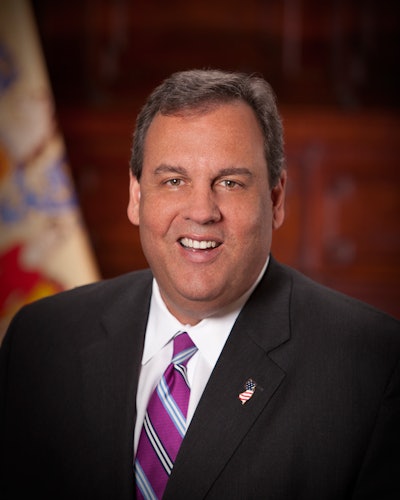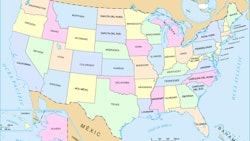
NJ Governor Chris Christie has said he will veto any marijuana legalization bill. (Photo: Official NJ government photo.)
By Noelle Skodzinski
updated 02/20/15
MERCHANTVILLE, NJ–Marijuana legalization advocates held a press conference today to officially launch the campaign to legalize recreational marijuana in New Jersey and to announce the launch of New Jersey United for Marijuana Reform. The advocacy organizations behind the press conference–including the American Civil Liberties Union (ACLU) of New Jersey, the NAACP State Conference of New Jersey, and the New Jersey State Municipal Prosecutors' Association–are working carefully to craft legislation that would regulate marijuana like alcohol in the Garden State.
Advocacy efforts here, however, face a fairly steep hill for a couple of reasons, not the least of which is that New Jersey Governor Chris Christie has made it quite clear that he would veto any marijuana legalization bills that came across his desk.
"I do not think [legislation] will pass while Governor Christie is in office," says Roseanne Scotti, state director of the New Jersey office of the Drug Policy Alliance, which works nationally on drug policy reform. Christie's term runs until 2018, unless he resigns (which is considered unlikely) to run for president. And despite some political challenges, including "Bridgegate," he still is considered a possible frontrunner for the GOP.
Christie is the reason the state's medical marijuana program "got up and running ever so slowly," says Scotti. In fact, the state's program has become highly criticized. Four-years-plus into the program and just three dispensaries are operational, and a small fraction of patients are being served by the program. The problems, Scotti says, are not with the legislation, but with the regulations that happened after Christie came into office.
But all the blame can't be put on Christie for the current environment surrounding recreational-marijuana legalization efforts. "We're also not where we need to be with the senate and the assembly," Scotti says.
In fact, a bill–Senate Bill 1896–to legalize recreational marijuana, and regulate it like alcohol, was actually introduced nearly a year ago by Democratic Senator Nicholas Scutari, and it's still alive, but has not advanced out of committee yet. And "a good way to take the temperature on where we are," says Scotti, "is if you look at the Senate Bill, Senator Scutari is the only person sponsoring it. It was introduced in March of last year, and at this point, no other senators have signed on as co-sponsors. In the assembly, only two people have signed on. If people haven't signed on, they're probably not going to vote for it," she says.
So what's next? "Hard work in building support," Scotti says. With major organizations, such as the DPA, the ACLU and the NJ NAACP, behind the cause, it certainly has a strong foundation. But, she notes, "it's a matter of building support for it with various groups. We need to let legislators know that there is support for this."
And, in fact, there is quite a bit of support. “Recent polls show that a strong majority of New Jersey voters support legalizing, taxing, and regulating marijuana," says Rachelle Yeung, Legislative Analyst with the Marijuana Policy Project, another advocacy group that coordinates many of its efforts with the DPA. "It’s time for the New Jersey Legislature to represent the will of its constituents, and approve Senator Scutari’s bill SB 1896 that would do just that. Unfortunately, the current Governor has stated repeatedly that he is opposed to this sensible marijuana policy reform.”
Also up next–or actually already in progress–is work on building what Scotti says will be a better bill, building on SB1896's foundation, but one that will have more detail. "We need to come up with solid amendments to get the best bill possible," she says.
To do so, advocacy groups working in New Jersey are enlisting the help of experts such as Tamara Todd, a former staff attorney at the DPA and current head of the DPA's Division of Marijuana Law and Policy in the organization's Office of Legal Affairs. Todd worked on legislation that has passed in Colorado, Washington and Oregon.
"It's a complicated piece of legislation, not a referendum, which is generally broader" says Scotti. "We need to get it right."
Especially after seeing a good piece of medical marijuana legislation "whittled down," she notes, "we don't want to see that happen with this."
Why Not Decriminalization?
A decriminalization bill–Assembly, No. 218 (or A218)–was filed for introduction during the 2014 session, but has been met with little fanfare. When asked if decriminalization of marijuana (making possession a civil offense punishable by a fine vs. jail time) was off the table, Scotti believes that it is, or should be. One of the biggest reasons is that with decriminalization "you still have the illegal market," she says. "We believe people should have safe and legal access to marijuana."
Plus, the time and effort that would be spent to pass a decriminalization bill will be better spent on a full-legalization bill, she says.
Overall, Scotti considers decriminalization a "half measure," and one that "is not where we need to be in terms of social justice. Hopefully our allies will move on to efforts to tax and regulate marijuana," she says.
What Can Industry Constituents and the Public Do?
To support the efforts happening in New Jersey, those in the industry and the public can join DPA, donate, sign up for the mailing list to receive updates and calls to action (along with guidance on how to help affect change). The more financial and advocacy support from the public and the industry, the more the organization can do to work toward making legalization a reality.
Scotti also encourages New Jersey residents to call the legislators in their districts and say, "I support this, and I want you to support this." If you're not sure who to contact, the National Organization to Reform Marijuana Laws (NORML) has a search function on its website, where you can type in your ZIP code to find your senators and representatives, as well as local legislators.



























